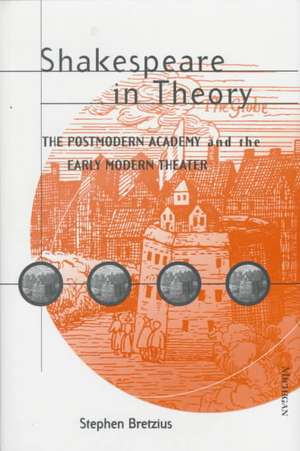Shakespeare in Theory: The Postmodern Academy and the Early Modern Theater
Autor Stephen Bretziusen Limba Engleză Hardback – 3 dec 1997
Shakespeare in Theory: The Postmodern Academy and the Early Modern Theater offers a provocative, highly original premise: that present-day literary criticism and theory have been shaped by the same institutional forces that shaped the theater of Shakespeare's day. Stephen Bretzius argues that Shakespeare's poetry and drama have been central to the development of postwar literary and cultural criticism, not just because his works validate these various critical approaches, but because the approaches variously replay his works, from the theater of the Renaissance to the contemporary American university. Where early modern theater once usurped the university, the postmodern university now refashions the theater, recasting in a theoretical register the same disappearing subjects, ideological contradictions, and imperialist illusions that it uncovers in Shakespeare.
Individual chapters provide provocative interpretations of various postwar critical schools and Shakespearean dramas, including the New Historicism and Hamlet, feminism and The Taming of the Shrew, pragmatism and Henry V. Other approaches, including psychoanalysis, multiculturalism, feminism, deconstruction, and nuclear criticism are brought to bear on Love's Labor Lost, Julius Caesar, and Othello. A final chapter on Shakespeare and the Beatles provides a lively conclusion to an imaginative and thought-provoking volume.
"A wonderful book, both witty and incisive in its analysis of cold war literary theory. Bretzius proves the astounding thesis that Shakespearean plot provides the archetypes of theoretical desire for the postwar academy. Paul de Man, Jacques Derrida, Stephen Greenblatt, René Girard, Joel Fineman, pragmatists and feminists alike, appear among the cast of characters in the postmodern play-within-a-play called the 'University.' Bretzius's strong readings of Shakespeare and literary theory will instruct Renaissance and theory scholars alike and amuse a wide audience of readers."
--Tobin Siebers, University of Michigan
--Tobin Siebers, University of Michigan
Stephen Bretzius is Lecturer, Chaffey College.
Preț: 356.02 lei
Preț vechi: 409.22 lei
-13% Nou
Puncte Express: 534
Preț estimativ în valută:
68.13€ • 70.77$ • 56.60£
68.13€ • 70.77$ • 56.60£
Carte indisponibilă temporar
Doresc să fiu notificat când acest titlu va fi disponibil:
Se trimite...
Preluare comenzi: 021 569.72.76
Specificații
ISBN-13: 9780472108534
ISBN-10: 0472108530
Pagini: 168
Dimensiuni: 152 x 229 x 20 mm
Greutate: 0.46 kg
Ediția:First Edition
Editura: UNIVERSITY OF MICHIGAN PRESS
Colecția University of Michigan Press
ISBN-10: 0472108530
Pagini: 168
Dimensiuni: 152 x 229 x 20 mm
Greutate: 0.46 kg
Ediția:First Edition
Editura: UNIVERSITY OF MICHIGAN PRESS
Colecția University of Michigan Press
Notă biografică
Stephen Bretzius is Lecturer, Chaffey College.
Recenzii
"A wonderful book, both witty and incisive in its analysis of cold war literary theory. Bretzius proves the astounding thesis that Shakespearean plot provides the archetypes of theoretical desire for the postwar academy. Paul de Man, Jacques Derrida, Stephen Greenblatt, René Girard, Joel Fineman, pragmatists and feminists alike, appear among the cast of characters in the postmodern play-within-a-play called the 'University.' Bretzius's strong readings of Shakespeare and literary theory will instruct Renaissance and theory scholars alike and amuse a wide audience of readers."
--Tobin Siebers, University of Michigan
--Tobin Siebers, University of Michigan
"The theoretical sophistication of this title marks it for an advanced readership; the systematic juxtaposition of Shakespeare's plays and the postmodern academy distinguishes this book as unique."
---Choice
---Choice
"This provocative book will excite discussion in its projecting of a necessary reconfiguration of theory and theatre for the postmodern world."
--Karoline Szatek, Shakespeare Bulletin
--Karoline Szatek, Shakespeare Bulletin
Descriere
Witty and engaging essays on the links between contemporary literary theory and Shakespearean theater
